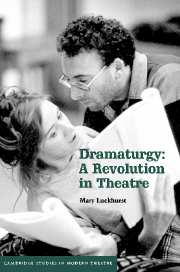Book contents
- Frontmatter
- Contents
- List of illustrations
- Acknowledgements
- List of abbreviations
- 1 Introduction
- 2 Gotthold Lessing and the Hamburg Dramaturgy
- 3 Dramaturgy in nineteenth-century England
- 4 William Archer and Harley Granville Barker: constructions of the literary manager
- 5 Bertolt Brecht: the theory and practice of the dramaturg
- 6 Kenneth Tynan and the National Theatre
- 7 Dramaturgy and literary management in England today
- 8 Conclusion
- Select bibliography
- Index
4 - William Archer and Harley Granville Barker: constructions of the literary manager
Published online by Cambridge University Press: 22 September 2009
- Frontmatter
- Contents
- List of illustrations
- Acknowledgements
- List of abbreviations
- 1 Introduction
- 2 Gotthold Lessing and the Hamburg Dramaturgy
- 3 Dramaturgy in nineteenth-century England
- 4 William Archer and Harley Granville Barker: constructions of the literary manager
- 5 Bertolt Brecht: the theory and practice of the dramaturg
- 6 Kenneth Tynan and the National Theatre
- 7 Dramaturgy and literary management in England today
- 8 Conclusion
- Select bibliography
- Index
Summary
Archer and Barker's construction of the office of Literary Manager was framed within their campaign for a national theatre and emerged from what leading late-nineteenth-century literary and cultural figures agreed was a crisis in English theatre. The term first appeared in the ‘Blue Book’, Scheme and Estimates for a National Theatre, privately printed and distributed in 1904 and published in 1907, when it became a focus of the national theatre debate. In Scheme and Estimates Archer and Barker constructed an alternative model to the prevailing autocracy of actor-managers by creating a new functionary, the Literary Manager, and inserting him into the artistic hierarchy. The inscription of this new official into theatre management theoretically achieved three key things: it highlighted the centrality of dramatic literature to the national project, posited the Literary Manager as guardian of literary standards, and secured a playwrights' advocate at the heart of theatre. In these respects Archer and Barker's invention of the Literary Manager can be understood as a manifestation of the wider ideological mission of the late nineteenth-century theatrical avant-garde and literary canon shapers in England, ardently campaigning for the elevation of dramatic literature and of the playwright's status. Archer and Barker's proposal preceded practice by over half a century, and if they overestimated the public will for a national theatre, they underestimated the determined conservatism of actor-managers.
- Type
- Chapter
- Information
- DramaturgyA Revolution in Theatre, pp. 78 - 108Publisher: Cambridge University PressPrint publication year: 2006

